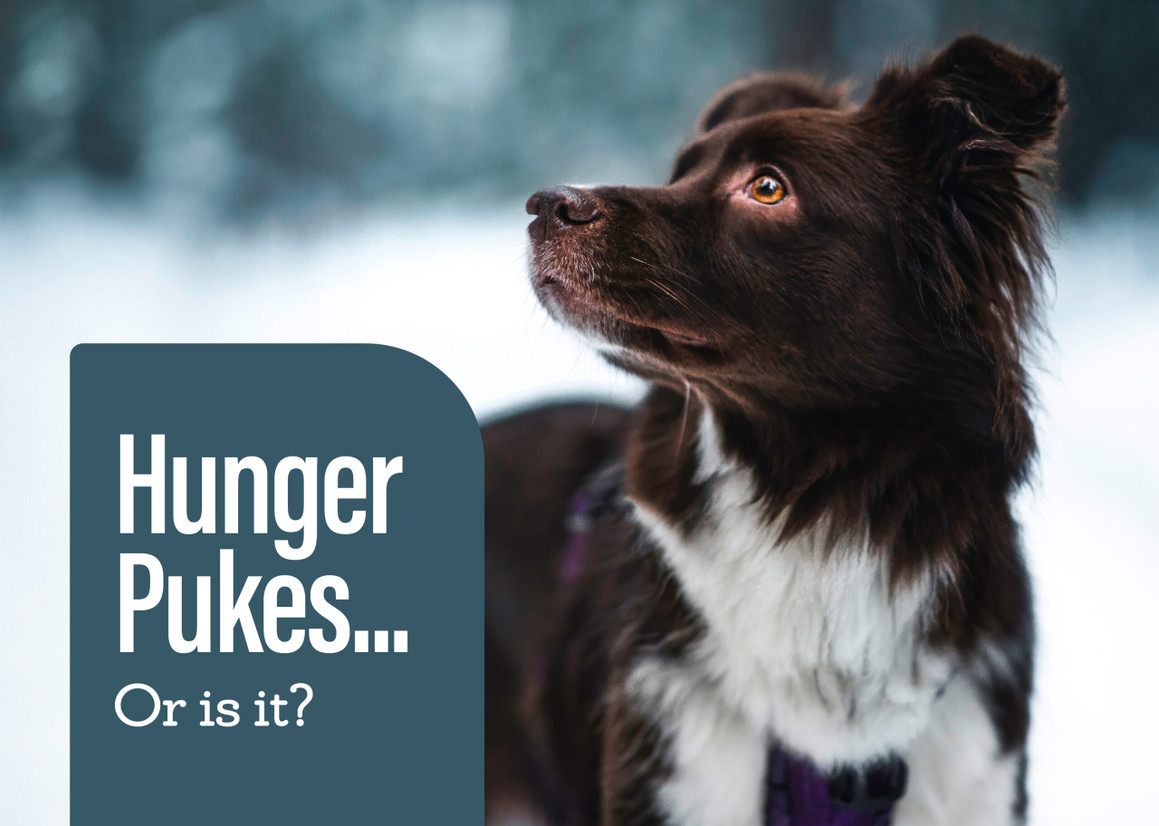Hunger Pukes Explained
Has your dog ever vomited a bright yellow foamy liquid mixed with saliva? Have you ever heard it referred to as “hunger pukes”? Though this type of vomiting is quite common in dogs, happening when the stomach is empty, it is not related to hunger like the name suggests. The real term is bile acid reflux.
To better understand how to solve this issue, it is important to understand where it originates: bile acid is produced by the liver and stored in the gallbladder. When food is emptied from the stomach, arriving in the duodenum, the gallbladder secretes some of the bile acid to aid in food digestion. Different foods require different amounts of bile acid. To illustrate this, bile acid is used to digest fat; the more fat in the diet, the more bile acid is needed. Some carbs and fiber can bind with bile acid making it unavailable for fat digestion so when a diet is high in carbs and fiber, there will also be more bile acid production, but not for the same reason.
It’s the liver’s job to manage bile acid production, the gallbladder only stores it! The liver “tells” the gallbladder when, and how much bile acid to secrete. The signal for this communication is triggered by food. If bile acid production is influenced by diet, and bile acid secretion happens when food reaches the duodenum, why do some dogs vomit bile when their stomachs are empty?
There could be multiple reasons, and sometimes completely opposite explanations for excess bile production from one dog to another. It will, unfortunately, be determined by trial and error. Usually, something in the diet will create an overproduction and secretion of bile acid. These secretions have a tough time moving forward in the digestive tract, staying “stuck” in the duodenum, and are vomited.
The first thing to do is take note of when the episodes are happening. What time of day? How long has the dog been on raw? What were they eating prior to the transition? Could it be related to a specific protein? Could fat or carbohydrate content be the problem? Is it the time of day or the number of meals per day? The worst-case scenario, if no consistencies or linked dietary causation can be found causing the bile acid reflux, is a liver issue. If the dog has had multiple episodes of bile vomitus, and diet change did not improve or resolve the problem, it is best to have the vet evaluate liver function through a simple blood test. Depending on the results, there are some liver support diets and supplements that can help. Simply reach out to Big Country Raw’s customer service if you need help with a special liver support diet for your dog.
The other possible cause can be excess fat in the diet. If the diet is too high in fat (which can vary from dog to dog), and the liver is over-stimulated, switching to a reduced fat diet may solve the issue. The opposite could also be possible: If a dog is used to eating a higher fat diet, and occasionally getting a lower fat meal, vomiting bile hours later could indicate there was too much bile acid secreted and not enough fat in the diet to “use” it.
To further complicate things, bile acid pukes can also be related to the carbohydrate content, often common after transitioning from kibble to a raw diet. During the first days of the transition, the dog’s liver has not yet adapted to the lower carbohydrate content of the new food. This means it continues producing high levels of bile acid to compensate for the very high carb content of the kibble the body is used to. Since there are no more carbs to bind with, the extra bile acid creates reflux because it is not “used” and can’t move down the digestive tract. If this is the case, time will usually solve the issue because the liver adapts, producing less bile as it’s not needed with a lower carb diet. Adding some extra fruits and vegetables to their meals for the first couple of days may help to ease the transition, decreasing them over time.
Dogs who have been on kibble for multiple years may continue to need extra carbs added to their raw diet because the liver is unable to adjust the production of the bile acid. Selecting low glycemic carbohydrates like green beans, zucchini, kale, blueberries, or cranberries and feeding as little as 15% – 20% of the overall diet might be enough to eliminate the reflux.
It might also be helpful to explore if the frequency of meals is affecting the condition. Eating two or more meals daily may overstimulate the liver, causing excess bile production, since bile secretion is stimulated by food in the duodenum. In this case, eating only one meal daily, usually in the evening, might completely solve the issue without further dietary changes.
Reversely, other dogs might benefit from additional meals daily. There could be a genetic factor causing the overproduction of bile acid in the liver, and the gallbladder just randomly secretes when it’s too full. For these dogs, extra meals can help prevent reflux, absorbing additional acid. Two meals or more, late night or early morning snacks, might solve the problem. The bile acid amount won’t be reduced, but at least it won’t be vomited.
Finally, gallbladder stones can also be the source of the issue but can only be seen and diagnosed with an ultrasound. The ultrasound can also show other types of diseases that could affect the gallbladder. Gallbladder stones occur more than we realize. In the worst cases, they can completely block the secretion of bile acid! Long term, those big stones can cause pancreatitis attacks. When there is not enough bile acid to help digest the food, there is a higher demand on the pancreas, causing inflammation. In less concerning scenarios, a small stone could partially block the secretion of bile acid and when the stone finally passes, there can be a sudden secretion of bile acid, creating reflux.
All of this is to explain that “hunger pukes” really have nothing to do with being hungry. It usually happens when the stomach is empty, but there could be multiple reasons for the bile acid reflux, some of which need to be taken seriously and could potentially require a vet visit. Do not hesitate to contact Big Country Raw if you need help finding the cause of these episodes. It is also important to speak with your veterinarian, as they are the only ones who can diagnose liver or gallbladder diseases.
Recent Posts
-
Join the Raw-volution: Small changes, big impact
This month, we're highlighting health - how making a few small, intentional changes can have a big i
-
Holiday Wellness Tips: A stress-free season for you and your pet
The holiday season is full of sparkle, excitement, and delicious food, but it can also disrupt your
-
Feeding Your Senior Pet: Supporting them in their Golden Years
Most raw feeding conversations revolve around transitioning puppies or adult dogs. Once the switch i





